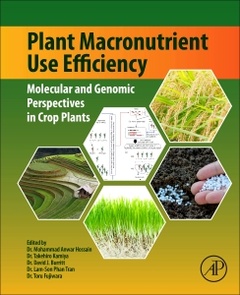Plant Macronutrient Use Efficiency Molecular and Genomic Perspectives in Crop Plants
Coordonnateurs : Hossain Mohammad Anwar, Kamiya Takehiro, Burritt David, Phan Tran Lam-Son, Fujiwara Toru

Plant Macronutrient Use Efficiency presents an up-to-date overview of the latest research on the molecular and genetic basis of macro-nutrient use efficiency (NUE) in plants, and strategies that can be used to improve NUE and nutrient-associated stress tolerance in crop plants. Plant NUE is a measure of how efficiently plants use available nutrients and an understanding of plant NUE has the potential to help improve the use of limited natural resources and to help achieve global food security. This book presents information important for the development of crop plants with improved macro-NUE, a prerequisite to reducing production costs, expanding crop production into noncompetitive marginal lands with low nutrient resources, and for helping to prevent environmental contamination.
Plant Macronutrient Use Efficiency provides a comprehensive overview of the complex mechanisms regulating macro-NUE in crop plants, which is required if plant breeders are to develop modern crop varieties that are more resilient to nutrient-associated stress. Identification of genes responsible for macro-NUE and nutrient-related stress tolerance in crop plants will help us to understand the molecular mechanisms associated with the responses of crop plants to nutrient stress.
This volume contains both fundamental and advanced information, and critical commentaries useful for those in all fields of plant science research.
1. Molecular and Genetic Basis of Plant Macronutrient Use Efficiency: Concepts, Opportunities, and Challenges 2. Role of Nutrient-Efficient Plants for Improving Crop Yields: Bridging Plant Ecology, Physiology, and Molecular Biology 3. Macronutrient Sensing and Signaling in Plants 4. The Significance of Nutrient Interactions for Crop Yield and Nutrient Use Efficiency 5. The Contribution of Root Systems to Plant Nutrient Acquisition 6. Molecular Genetics to Discover and Improve Nitrogen Use Efficiency in Crop Plants 7. The Role of Root Morphology and Architecture in Phosphorus Acquisition: Physiological, Genetic, and Molecular Basis 8. Potassium Sensing, Signaling, and Transport: Toward Improved Potassium Use Efficiency in Plants 9. Understanding Calcium Transport and Signaling, and its use Efficiency in Vascular Plants 10. The Role of Calcium in Plant Signal Transduction Under Macronutrient Deficiency Stress 11. Magnesium Homeostasis Mechanisms and Magnesium use Efficiency in Plants 12. Advances in Understanding Sulfur Utilization Efficiency in Plants 13. Water Availability and Nitrogen use in Plants: Effects, Interaction, and Underlying Molecular Mechanisms 14. NPK Deficiency Modulates Oxidative Stress in Plants 15. Genetic Improvements of Traits for Enhancing NPK Acquisition and Utilization Efficiency in Plants 16. Endophytic Bacteria and Rare Earth Elements; Promising Candidates for Nutrient use Efficiency in Plants 17. Introduction to GWAS and MutMap for Identification of Genes/QTL using Next-Generation Sequencing 18. Transgenic Approaches for Improving Phosphorus use Efficiency in Plants 19. Transgenic Approaches for Improving Nitrogen and Potassium use Efficiency in Plants 20. Future Climate Change and Plant Macronutrient use Efficiency
Affiliations and Expertise
Department of Genetics and Plant Breeding, Bangladesh Agricultural University, Mymensingh, Bangladesh
Dr. Takehiro Kamiya is an Associate Professor at the Laboratory of Plant Nutrition and Fertilizers, Department of Applied Biological Chemistry, Graduate School of Agricultural and Life Sciences, at The University of Tokyo, Japan. He obtained his PhD, in 2006, from Nagoya University, Japan. After doing his postdoctoral research at the Nagoya University (2006–07), University of Tokyo (2007–10), Aberdeen University (2010–12), he accepted the position of lecturer at the University of Tokyo. Since 2015, he has been an Associate Professor at the University of Tokyo. His current research interests are
unde
- Provides details of molecular and genetic aspects of NUE in crop plants and model plant systems
- Presents information on major macronutrients, nutrient sensing and signaling, and the molecular and genomic issues associated with primary and secondary macronutrients
- Delivers information on how molecular genetic information associated with NUE can be used to develop plant breeding programs
- Includes contributions from world-leading plant nutrition research groups
Date de parution : 07-2017
Ouvrage de 418 p.
19x23.3 cm
Thèmes de Plant Macronutrient Use Efficiency :
Mots-clés :
acid soils; agronomic practices; AKT1; ammonium; antioxidants; AtHAK5; bacteria; bioinformatics; biological N fixation; Ca+/H+ antiporter; calcium; calcium channels; calcium distribution; calcium sensors; calcium signaling; calcium transport; calcium use efficiency; climate smart agriculture; crop yield; deficiency; deprivation; Elevated CO2; endophytes; fertilizers; genes; genetic approach; genetic background; genetic improvement; genome editing; germplasm; glucosinolates; glutathione; GWAS; H+-ATPase; K deficiency; law of the optimum; macronutrient sensing signaling in plants; macronutrient use efficiency; macronutrients; magnesium; membrane transport; membrane transporters; Mg deficiency; Mg enrichment; Mg homeostasis; Mg toxicity; Mg2+ transporter; microorganisms; molecular breeding; molecular markers; molecular mechanisms; MutMap; NGS; nitrate transporter; nitrates; nitrogen; nitrogen assimilation; nitrogen uptake; nitrogen use efficiency; NPK; nutrient acquisition; nutrient assimilation; nutrient availability; nutrient budgets; nutrient interactions; nutrient remobilization; nutrient sensing; nutrient transport; nutrient uptake; nutrient use efficiency; nutrient utilization; nutrient-efficiency; omics; oxidative stress; P mobilization; P recycling; phenotyping; phosphorous; phosphorus; phosphorus acquisition efficiency; postanthesis nitrogen uptake; potassium; potassium channel; potassium transport; potassium transporter; potassium use efficiency; QTL; rare earths; regulation; response; root; root anatomy; root architecture; root development; root exudates; root morphology; root system architecture; root traits; roots architecture; ROS



